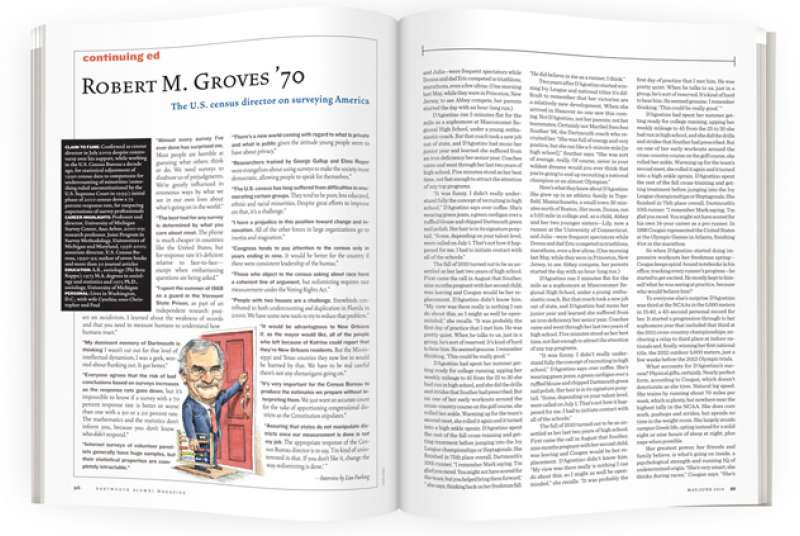
Robert M. Groves ’70
Notable Achievements: Confirmed as census director in July 2009 despite controversy over his support, while working in the U.S. Census Bureau a decade ago, for statistical adjustment of 1990 census data to compensate for undercounting of minorities (something ruled unconstitutional by the U.S. Supreme Court in 1999); initial phase of 2010 census drew a 72 percent response rate, far outpacing expectations of survey professionals
Career Highlights: Professor and director, University of Michigan Survey Center, Ann Arbor, 2001-09; research professor, Joint Program in Survey Methodology, Universities of Michigan and Maryland, 1996-2001; associate director, U.S. Census Bureau, 1990-92; author of seven books and more than 50 journal articles
Education: A.B., sociology (Phi Beta Kappa); 1973 M.A. degrees in sociology and statistics and 1975 Ph.D., sociology, University of Michigan
Personal: Lives in Washington, D.C., with wife Cynthia; sons Christopher and Paul
“Almost every survey I’ve ever done has surprised me. Most people are horrible at guessing what others think or do. We need surveys to disabuse us of prejudgments. We’re greatly influenced in erroneous ways by what we see in our own lives about what’s going on in the world.”
“The best tool for any survey is determined by what you care about most. The phone is much cheaper in countries like the United States, but for response rate it’s deficient relative to face-to-face—except when embarrassing questions are being asked.”
“I spent the summer of 1968 as a guard in the Vermont State Prison, as part of an independent research project on recidivism. I learned about the weakness of records and that you need to measure humans to understand how humans react.”
“My dominant memory of Dartmouth is thinking I wasn’t cut out for that level of intellectual dynamism. I was a geek, worried about flunking out. It got better.”
“Everyone agrees that the risk of bad conclusions based on surveys increases as the response rate goes down, but it’s impossible to know if a survey with a 70 percent response rate is better or worse than one with a 90 or a 20 percent rate. The mathematics and the statistics don’t inform you, because you don’t know who didn’t respond.”
“Internet surveys of volunteer panelists generally have huge samples, but their statistical properties are completely intractable.”
“There’s a new world coming with regard to what is private and what is public given the attitude young people seem to have about privacy.”
“Researchers trained by George Gallup and Elmo Roper were evangelists about using surveys to make the society more democratic, allowing people to speak for themselves.”
“The U.S. census has long suffered from difficulties in enumerating certain groups. They tend to be poor, less educated, ethnic and racial minorities. Despite great efforts to improve on that, it’s a challenge.”
“I have a prejudice in this position toward change and innovation. All of the other forces in large organizations go to inertia and stagnation.”
“Congress tends to pay attention to the census only in years ending in nine. It would be better for the country if there were consistent leadership of the bureau.”
“Those who object to the census asking about race have a coherent line of argument, but redistricting requires race measurement under the Voting Rights Act.”
“People with two houses are a challenge. Snowbirds contributed to both undercounting and duplication in Florida in 2000. We have some new tools to try to reduce that problem.”
“It would be advantageous to New Orleans if, as the mayor would like, all of the people who left because of Katrina could report that they’re New Orleans residents. But the Mississippi and Texas counties they now live in would be harmed by that. We have to be real careful there’s not any shenanigans going on.”
“It’s very important for the Census Bureau to produce the estimates we prepare without interpreting them. We just want an accurate count for the sake of apportioning congressional districts as the Constitution stipulates.”
“Assuring that states do not manipulate districts once our measurement is done is not my job. The appropriate response of the Census Bureau director is to say, ‘I’m kind of uninterested in that. If you don’t like it, change the way redistricting is done.’ ”
—Interview by Lisa Furlong










